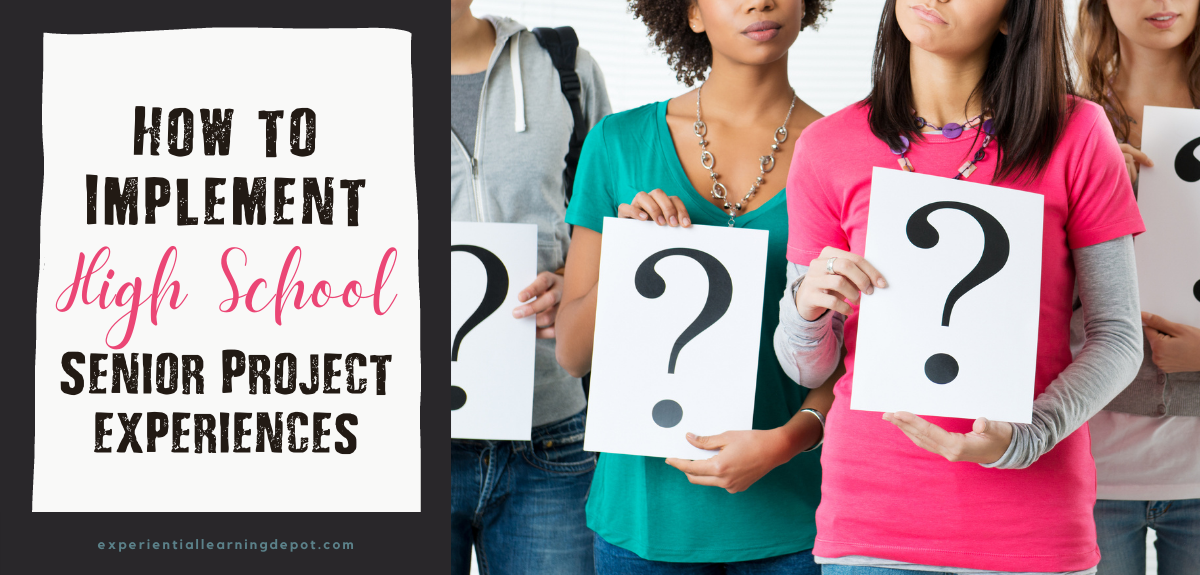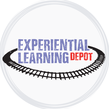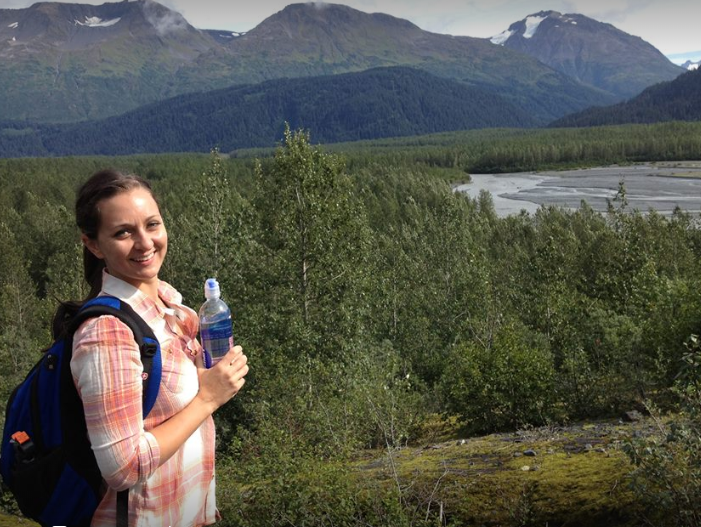|
Experiential learning resources for the innovative educator
Teaching high school senior seminars and observing outcomes has been one of the highlights of my career as an educator. The benefits of high school senior seminars are out of this world.
I have witnessed and been a part of implementing a variety of senior seminars, which essentially consists of the facilitation of a year-long (or semester-long) senior project. There has been a lot of trial and error, and I have developed a comprehensive senior experience that incorporates the best parts of each of those senior project varieties.
There are so many different ideas for senior project elements or senior seminar components from projects to papers to internships and more.
This blog post goes over the different senior project elements that I have loved incorporating into senior seminars and a how-to-guide for facilitating those senior experience components. I will show you how I put those senior project ideas together to coordinate and manage a comprehensive college and career ready senior experience that prepares and excites students for life after high school.
The senior project resource above includes templates and guiding materials for each of the senior seminar components that I mention in this post.
But you can also get a glimpse into the experience and prepare to teach a senior seminar with a FREE senior seminar syllabus and implementation spreadsheet.
It's important to note that implementation of my senior experience resource will vary widely among you. You might be working with one homeschooled senior, while someone else reading this is working with a senior advisory of 30+ students.
One of you might have senior seminars for 1 hour per day for the entire year to work on senior projects, while another is on a block schedule. That is another important benefit of having the syllabus and senior experience implementation spreadsheet mentioned above. They are editable, so you can modify them to fit your needs. How to Teach High School Senior Seminars
Step 1: Introduce the Senior Experience
I gather my senior seminar students the first week of school to introduce the experience. Remember, this is a long-term adventure, so making students aware and getting them excited about senior projects early on is important.
My introduction often includes:
Step 2: Develop Personal Learning Plans
This senior project that is facilitated through senior seminars is very personal, meaning each student will go on their own journey. They will follow their own interests and develop goals that are unique to them. Therefore, you need to personalize learning.
My senior experience includes a senior-specific personal learning plan. Developing their personal learning plans will be the first action taken in the senior seminar after the project introduction. You might dive into this immediately after the intro, or wait a week or so. It depends on your schedule. But the personal learning plan should be filled out before moving onto the other senior seminar components such as the career exploration project-based learning experience. These are the steps I take:
Step 3: Introducing 21st-Century Skills
In my personal opinion, 21st-century skills are just as essential as hard skills or content knowledge. Yes, to be a nurse you need to have a clear understanding of human anatomy, but you also need to be able to work well with others, communicate effectively with patients, problem-solve, and critically think.
So an important phase of senior seminars is building 21st-century skills. Your seniors will build these skills through authentic learning experiences and then reflect on and showcase those skill-building experiences using a 21st-century skills portfolio/journal. The senior project resource includes this 21st-century skill-building portfolio. I distribute this portfolio around the same time as the personal learning plan because building this portfolio is a long-term experience. Students build it over the course of the session. How I implement my 21st-century skills portfolio:
Step 4: Career Exploration
Once students have identified their interests, strengths, challenges, goals, etc. using their personal learning plan resource, they can begin their career exploration experience. I do this through self-directed project-based learning, and my senior project resource includes the templates for this PBL project.
You can expect this project-based learning experience to take anywhere from 1-2 weeks. This is my process:
This project will help students identify suitable careers to work toward. They may determine from this experience that the career they chose to explore is not for them. That is the one of the most important reasons for doing this project at all. If you have a student that is not interested in the career they chose to study for this project, they can try again as many times as they would like. The idea is to get students working with professionals in their career of interest to determine if that career is a good fit.
Step 5: Senior Community Action Project
The most powerful and important part of high school senior seminars in my opinion is the career-based community action project. A community action project is a self-directed project-based learning experience with a service-learning twist; the perfect resume-builder for high school students.
This experience helps students build a variety of 21st-century skills and provides an impressive volunteer experience to add to their resumes and/or career portfolios. These projects take anywhere from 6-12 weeks. They are deep learning experiences that involve sustained inquiry. So we dive into this project right after students have completed their career exploration projects.
This is my facilitation process:
Step 6: Building Career Portfolios
All of the phases of the high school senior seminar up to this point have led you and your students right here; to building a career portfolio that they can carry with them beyond high school.
You can have students utilize this portfolio at different times throughout the senior seminar and in different ways. Here are some options:
There is not one way to use the career portfolio. Do what works well for you and your students.
Step 7: Senior Presentations
Our students share their senior projects at a senior project night at the end of the year. Students invite their friends, families, and community experts to see presentations of their senior experiences. You can make the event as formal or informal as you'd like, in-person or virtual, a small intimate group or the entire community.
Do what works for you and your students! That has become a theme throughout this post, and many of my posts for that matter!
Implementing and facilitating high school senior seminars is not easy to nail down in a blog post because the experiences will vary between teachers and students.
I wish I could be in each of your classrooms and homeschools walking you along! But you got this. I know it. There will be some trial and error, yes. But you and your students will get it in time, especially with the senior project resource, syllabus, and implementation spreadsheet to help guide you through the process. You will figure out what works well for you and your students, and you won't regret trying. Senior projects are incredible. You got this!
More Resources for High Schoolers
Helpful Senior Seminar-Related Blog Posts
Digital Courses for High School Teachers and Parents:
Join our experiential learning Facebook group!
Did you know there is an experiential learning Facebook group? Check that out - Experiential Learning Community for K12 Teachers - and join in the discussion about experiential learning ideas! Find us on social media! Follow Experiential Learning Depot on Pinterest, Facebook, Youtube, and Instagram for more on experiential education, and check out my shop for experiential learning resources. Observe. Question. Explore. Share.
0 Comments
Your comment will be posted after it is approved.
Leave a Reply. |
Blog IntentTo provide innovative educational resources for educators, parents, and students, that go beyond lecture and worksheets. AuthorSara Segar, experiential life-science educator and advisor, curriculum writer, and mother of two. Categories
All
|



















 RSS Feed
RSS Feed